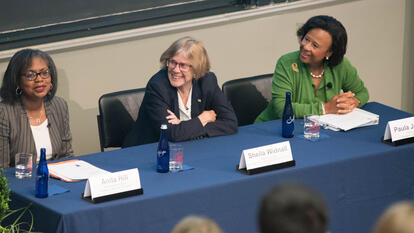Wellesley Professor Talks with Philadelphia Public Radio about Mathematical Principles in Daily Life

Oscar Fernandez, associate professor of mathematics at Wellesley, recently appeared on the public radio show The Pulse on Philadelphia’s WHYY to talk about the presence of mathematical principles in everyday life.
In the segment, called “Math Attack,” host Maiken Scott described the lack of mathematical proficiency in the United States as a national problem; she interviewed Fernandez and several other educators from across the county.
Fernandez, whose website, Surrounded by Math, espouses the concept that you can “learn mathematics by using what you already know about the world around you,” said on the program, “Oftentimes we don’t think of math as something that we can apply to a problem in the real world, but once you do you are going to get many more insights.”
In his book The Calculus of Happiness: How a Mathematical Approach to Life Adds Up to Health, Wealth, and Love, Fernandez writes about a variety of ways that algorithms can improve decision-making while maintaining people’s general well-being. On The Pulse, he used as an example a hypothetical situation involving two people who were deciding how to divide $5,000.
Dividing the sum into halves is not necessarily the answer, said Fernandez: “Half is the most equal distribution of the money, but it’s not the most equitable.” One person in the exchange could ask for $3,000 because she has never had such a large sum of money, he said. The two people would then have to factor in variables besides equal shares.
One person “might prefer more than half, and then the questions are what is fair; what is just; what is equitable?” said Fernandez.
“In order to use the formula, you have to quantify certain things that are important in the decision-making process that you might not have otherwise thought to quantify,” he said.
In an email, Fernandez explained his general approach to teaching mathematics. “The idea is to use our everyday experiences to motivate the mathematics to be learned, rather than beginning with abstract math concepts first and following that—often much later—by a real-world application,” he said.
Practical application, Fernandez said, can yield benefits. “Use our everyday experiences, interests, and curiosities to motivate the study of mathematics,” he said. “Done this way, math has inherent relevance, intrigue, and applicability. This approach also answers, right from the get-go, the age-old questions ‘Why should I learn this?’ and ‘When am I ever going to use this math?’”



